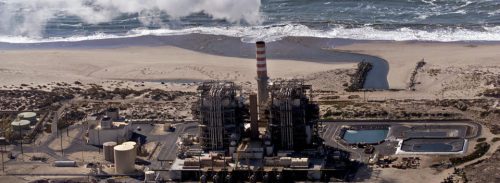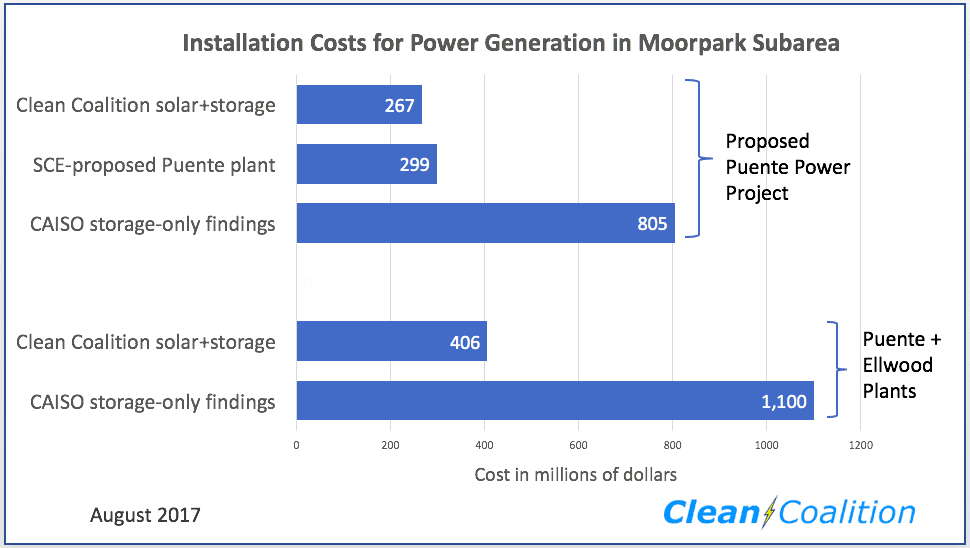
Press release: Solar+storage is more cost-effective than proposed gas plants in Southern California
The energy requirements for the Oxnard area can be met with solar+storage at a significantly lower price than with gas peaker plants, according to a new Clean Coalition study.
September 7, 2017
NEWS RELEASE: Solar+storage is more cost-effective than proposed gas plants in Southern California
The energy requirements for the Oxnard area can be met with solar+storage at a significantly lower price than with gas peaker plants, according to a new Clean Coalition study
MENLO PARK, CA – The Clean Coalition has released a study showing that use of solar+storage would be cheaper than building the proposed Puente Power Project natural gas plant and could cost-effectively replace the Ellwood Peaker Plant. The projects are both part of the Moorpark Subarea in California, which includes the cities of Oxnard, Santa Barbara, and Goleta. They were approved to meet local electricity capacity requirements that are currently served by about 2000 megawatts (MW) from the Mandalay and Ormond Beach power plants in this grid-constrained area of the Southern California Edison (SCE) service territory. Because both the Mandalay and Ormond facilities are out of date and will not conform to new state regulations, they’re expected to be retired at the end of 2020.
The Clean Coalition leveraged its unique policy, technical, and economic expertise to model realistic alternatives to the Puente and Ellwood plants. The models show that a solar+storage solution is achievable at $267 million to install, compared to $299 million for the Puente proposal. Solar+storage could replace both Puente and Ellwood for approximately $406 million.
This is in stark contrast to a study conducted by the California Independent System Operator(CAISO), which manages the state’s electric grid. CAISO’s study evaluated only storage, while ignoring far more cost-effective solar+storage, and concluded that replacing the Puente plant with incremental distributed energy resources and storage would cost $805 million, with a cost of up to $1.1 billion to replace both the Puente and the Ellwood plants.
“The CAISO study was highly valuable in demonstrating that distributed renewables are technically capable of meeting the reliability needs of the Moorpark Subarea,” said Craig Lewis, Executive Director of the Clean Coalition. “However, it overlooked a number of significant factors, including updated costs for solar+storage and the opportunity to apply the 30% Investment Tax Credit (ITC) to storage. With our experience in staging complex projects, the Clean Coalition was able to develop the most comprehensive model to date.”
The Clean Coalition model addresses these issues:
- The Clean Coalition model uses a cost-effective solar+storage solution, rather than modeling storage alone as was done by CAISO.
- The Clean Coalition uses up-to-date component cost estimates for 2018, compared to CAISO’s outdated storage costs from 2014. The cost of storage has fallen by over 40% since then.
- The Clean Coalition appropriately sizes the storage required, by modeling the real generation and dispatch capabilities of solar+storage. CAISO’s unrealistic profile of solar output and storage dispatch resulted in underestimating the energy generation of solar by nearly half and oversizing of storage.
- The Clean Coalition includes the impact of the 30% federal ITC, which can substantially lower the cost of solar+storage facilities, provided that 70% of the storage charging comes from co-located renewables. Because CAISO modeled additional storage without renewables, it could not account for reaping ITC benefits that result from a proper implementation featuring solar+storage.
- For demand response costs, which CAISO overestimated, the Clean Coalition model uses data from an April 2017 Lawrence Berkeley National Labs analysis, as well as current demand response contract costs as reported by Greentech Media in April 2017.

The CAISO study, as well as subsequent analysis by Greentech Media, also left out the costs of operations, maintenance, and fuel. These are expected to run about $19 million per year for Puente based on current costs, making it about twice as expensive as a solar+storage design. Accounting for these costs would raise the total cost of Puente to over $870 million over thirty years. A comparable calculation for a solar+storage facility would run about $462 million. Including the health, mortality, and social costs of carbon from the natural gas plant would increase the cost of Puente and Ellwood dramatically.
“Beyond being more cost-effective, the solar+storage approach provides substantial additional functionality and community benefits,” said Mr. Lewis. “And any quantification of the health and environmental value of solar+storage versus gas plants just adds to the vastly superior value of solar+storage.”
For more details, see the Clean Coalition filing on the Puente Power Project and the Clean Coalition model for alternatives to Puente and Ellwood, both available online. The Clean Coalition filing was submitted via the Center for Biological Diversity due to submissions requiring previously established party status. A prior Clean Coalition cost analysis of a solar+storage alternative to the Ellwood Peaker plant is also available online.
###
About the Clean Coalition
The Clean Coalition is a nonprofit organization whose mission is to accelerate the transition to renewable energy and a modern grid through technical, policy, and project development expertise. The Clean Coalition drives policy innovation to remove barriers to procurement and interconnection of distributed energy resources (DER) – such as local renewables, advanced inverters, demand response, and energy storage – and we establish market mechanisms that realize the full potential of integrating these solutions. In addition to being active in numerous proceedings before state and federal agencies throughout the United States, the Clean Coalition collaborates with utilities, community choice aggregation programs, municipalities, and other jurisdictions to create near-term deployment opportunities that prove the technical and economic viability of local renewables and other DER.
Contact
Rosana Francescato
Communications Director
rosana@clean-coalition.org
650-308-9046

